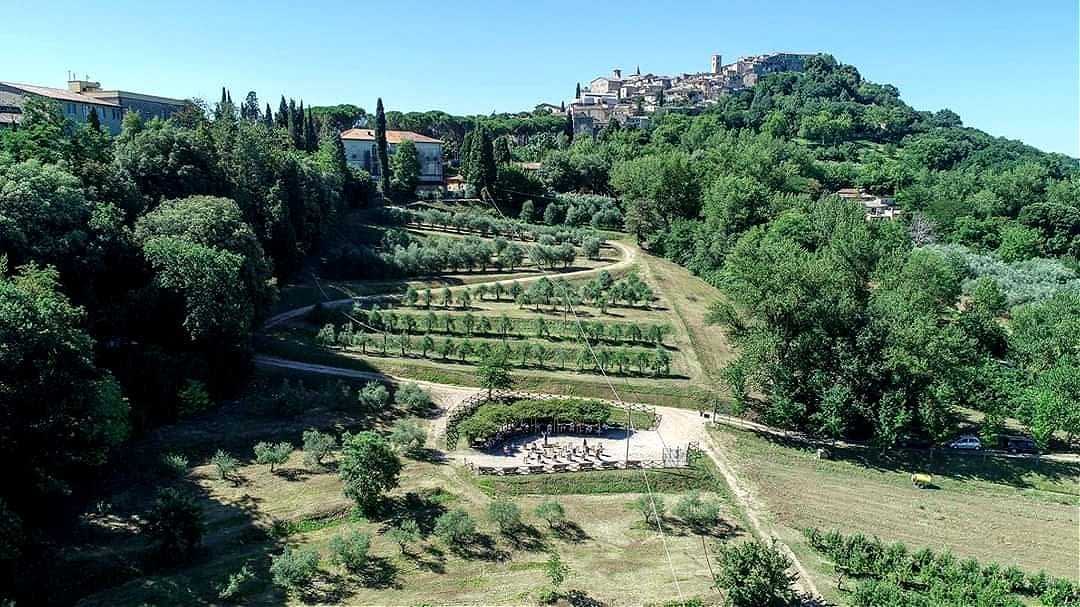Situated in the central Italian province of Perugia, students from the Ciuffelli Agricultural Institute of Todi – the country’s oldest agricultural school – are returning to a rather unique classroom this autumn.
The so-called Green Room replaces the ceiling with Umbria’s blue skies and boasts rows of olive trees instead of walls. While the country was in the midst of the Covid-19 pandemic last spring, students took their final exams in this outdoor classroom.
Spread over three types of terrain, in order to represent the various crops of the region… the property serves as a wide, multifunctional open-air laboratory for our students.
“In 2012, we had an idea to create an area at its core where they could further develop the knowledge acquired in the field,” the director of the farm, Gilberto Santucci, said.
“The Green Room is located at the heart of the farming estate managed by the institute,” he added. “Spread over three types of terrain, in order to represent the various crops of the region… the property serves as a wide, multifunctional open-air laboratory for our students, with its 75 hectares (185 acres).”
See Also:In Italy, Hiking Through the Olive GrovesShaded by rose pergolas, desks and chairs have been placed in a clearing surrounded by olive trees, which allows students to learn from a central position in the context of the territory, with the Tiber River below and Mount Subasio, the town of Assisi, and cultivated fields above.
“Located in the midst of our olive trees and overlooking the valley, the Green Room turned out to be the solution to organize the final exams last June, in a healthy environment and in compliance with the measures imposed to curb the spread of Covid-19,” Santucci said.

In the aftermath of a three-month lockdown, Italian schools and universities, like many others in the world, remained closed for the rest of the term and moved lessons online. Students of Ciuffelli and similar institutes could at least take solace in taking their final exam outdoors, reuniting with their classmates, even while appropriately distanced.
“Thanks to the Wi-Fi coverage, all the administrative formalities could be handled easily,” Santucci said, adding that during the summer the space was used to screen movies, present books and host art events. “The success of this initiative encourages us to use the Green Room even more often than before, especially at this time, in which outdoor activities are being encouraged.”
The property, which was founded in 1863 and housed in the thirteenth-century former monastery of Montecristo, is a model for its social and environmental commitments.
Since 2014, a small collection of olive varieties of Umbrian origin, including Moraiolo, Frantoio, and Pendolino have been cultivated on an adjacent plot. Additionally, another 4,000 olive trees have been restored by the institute and become the centerpiece of its mission.
“We run an educational farm that organizes environmental and agri-food activities, including olive oil production, for about 3,000 children each year,” Santucci said. “Also, we operate as a social farm that, through an inclusion project, hires at-risk people, such as the unemployed, immigrants and asylum seekers, who work in the recovered olive groves.”
In addition to promoting local olive varieties, the institute also manages a collection of olive trees from other countries in the Mediterranean basin, the Middle East and newer areas of cultivation.
The plants come from a larger collection of the olive germplasm gathered and preserved by the Institute for Agricultural and Forest Systems in the Mediterranean of the National Research Council (CNR) of Perugia.
“This collection, in addition to the conservation of the germplasm, is intended for its biological and agronomic evaluation and as a source of variability for genetic improvement,” Santucci said. “It represents a first nucleus, which will be enriched in the coming years with other varieties, species and subspecies similar to the olive tree. These collections are an integral part of the school’s educational offerings.”
The property also includes a vineyard and wine cellar, a cheese factory, a honey laboratory, an animal husbandry facility, a botanical park, orchards dedicated to the study of plants at risk of genetic erosion, and an oil mill used to produce a high-quality extra virgin olive oil.
“We won last year’s Silver Diploma competition, organized by Pandolea and Gambero Rosso and reserved for Italian agricultural schools,” Santucci said. “We are also part of a network whose next goal is to establish a foundation that can help make the Ciufelli Institute the driving force of national and international initiatives in the field of agricultural education and environmental sustainability.”









